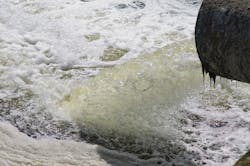Washington Wastewater Treatment Plant Sees Sewage Treatment Interference
Liberty Lake, Washington’s wastewater treatment plant has noticed thinner bacteria colonies that aid sewage treatment, reported the Spokesman-Review.
Most water treatment plants use biological nutrient removal to break down human waste and other larger compounds in water before its clarified, filtered and disinfected for discharge from the plant.
So far, the department has not seen the same levels of waste products remaining in treated water at other treatment plants. Officials are looking statewide for trends, according to Art Jenkins, the department’s wastewater permit supervisor for Eastern Washington.
This phenomenon coincides with government orders to stay home and clean surfaces thoroughly, according to BiJay Adams, general manager of the Liberty Lake Sewer and Water District.
“We’re a little at a loss because we can’t tell people, stop washing your hands or using bleach,” said Adams. “What we’re trying to do now is wait out the storm, if you will.”
Liberty Lake notified the state Department of Ecology, which is responsible for issuing permits for entities discharging water into the Spokane River, reported the Spokesman-Review.
“They’re seeing higher levels of ammonia and other things that are coming through,” said Jenkins of Liberty Lake. “Their bug population is down. It’s not as healthy.”
If the readings continue to spike, the potential damage would be algae blooms in the Spokane River, reported the Spokesman-Review.
Facilities both upstream and downstream have not yet reported issues with their bacterial colonies since the Health Department and the Centers for Disease Control and Prevention advised for people to frequently wash their hands and use hand sanitizer.
The city’s wastewater treatment plant uses a cleaning method called “trickling,” in which water is treated as it passes over plastic filters that bacteria cling to. No major impacts to this bacterial treatment has been seen since the pandemic began, reported the Spokesman-Review.
According to officials with the state Department of Ecology, the issue may be more prominent in Liberty Lake because of its smaller size and because it has fewer industrial users than larger wastewater systems.
Liberty Lake is working with the Ecology Department on potential approaches to maximize the cleaning operations of its plant.
